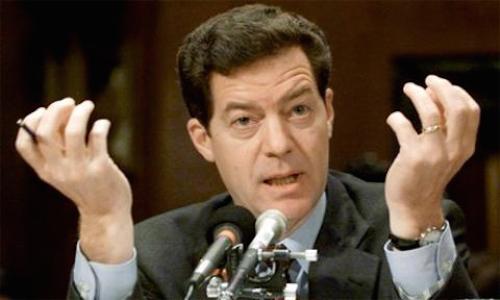One of the problems of contemporary conservatism is that it is largely theoretical. A lot of ideas now fashionable in the Republican Party are hard to evaluate on their merits, because they have never been tried. Some, like abolishing the Federal Reserve or income tax, remain theoretical because they would require us to reverse history. Others, like the belief that lowering taxes on the wealthy stimulates economic growth, are unfalsifiable because they have been stymied by political opposition. But no such opposition has existed in Kansas, where former Senator Sam Brownback was elected governor in 2010. For almost four years now, Brownback has conducted a “red-state experiment,” cutting taxes, restricting abortion, and dramatically reducing spending on schools. He put conservative theory into practice, and the results are in: poverty went up, the state budget faces a $300 million shortfall, and the Kansas economy has grown at half the rate of its four neighbors.
Maybe you read about it. The matter with Kansas has been a popular topic for the liberal internet these last two weeks, prompting the Wall Street Journal to complain that the failure of Brownback’s initiatives has been prematurely exaggerated. The arguments in that editorial—that the tax and spending cuts need more time to work, that they would have worked if the legislature had done more of them, and that liberals don’t want Kansas to succeed—neatly capture why conservative economic theory is so hard to talk about today.
When the experiment fails, it’s not that the theory was flawed; it’s that it wasn’t applied faithfully enough. Either that or it needs more time. Brownback himself employed this defense when the Post interviewed him on his way to Dodge City, where he was declaring a National Day of the Cowboy:
I wish I could take [the term “experiment”] back, because I don’t consider this an experiment. So many people on the left really want this to fail. . . . This is a long-term strategy to make us more competitive.
It’s not clear what “competitive” means in this context. If the desired result of this experiment long-term strategy based on untested hypotheses is to grow the Kansas economy or reduce poverty, those objectives have not panned out. If the goal is to make Kansas a better place for rich people, on the other hand, Brownback’s strategy is totally working.
His two tax packages eventually reduced Kansas’s top income tax rate from 6.45% to 3.9%. It reduced the lowest-bracket rate from 3.5% to 3%, but the elimination of various deductions—to say nothing of a statewide increase in sales tax—meant that taxes paid as a share of income by the lowest bracket actually went up 1.3%. Kansas also became the first state to completely eliminate taxes on business profits “passed through” to sole proprietors. As a result of these reforms—or as a completely arbitrary correlation, depending on whom you ask—the state’s revenues decreased 9.2% over 2012-2013, a period when other states saw, on average, a 2% revenue increase.
If you believe that the purpose of cutting taxes on corporations and top incomes is to stimulate the economy, then Brownback’s experiment has failed or, if you prefer, not succeeded yet. If, on the other hand, you believe that asking businesses and the rich to contribute less to society is an end in itself, the Kansas experiment is a success. The question is not “can we make people’s lives better by doing this?” but rather “will people let us do this if we tell them their lives will get better as a result?”
That’s another unfalsifiable claim, right there. We cannot know whether Brownback and other ultra-conservative theorists—including his economic advisor Arthur Laffer—sincerely believe that tax cuts for the rich help everyone, of if such policies simply benefit their supporters. Probably, the great epistemological problem of conservative economy theory—that it can never be proven wrong because nobody ever embraces it fully enough—exists so that Republicans don’t have to answer that question.
Hardly anyone, even Sam Brownback, gets into politics because he wants to screw poor people. Certainly some politicians, such as former Brownback staffer Paul Ryan, display less empathy for the poor than others. But every elected leader wants to feel like he’s helping the less fortunate, even if his policies appear to do the opposite.
The beauty of contemporary conservative economic theory is not just that it is unfalsifiable, but also that it reassures us in our most selfish moments. It’s okay to lower taxes on rich Kansans and raise them on poor ones, because that will actually help everybody. It’s okay to cut funding for schools so we can eliminate taxes on businesses, because that will mean better jobs eventually. These aren’t lies. They’re justifications. Brownback and his cohort haven’t assembled a plan for the future. They’ve built an architecture of reasons to feel better about what they’re doing now.





Cutting taxes on the wealthy as a way to stimulate economic growth is “falsifiable” if by that one means the claim can be weighed with good (if not perfect) evidence. And the evidence, based on past experiments, strongly suggests its false. http://fas.org/sgp/crs/misc/R42729.pdf